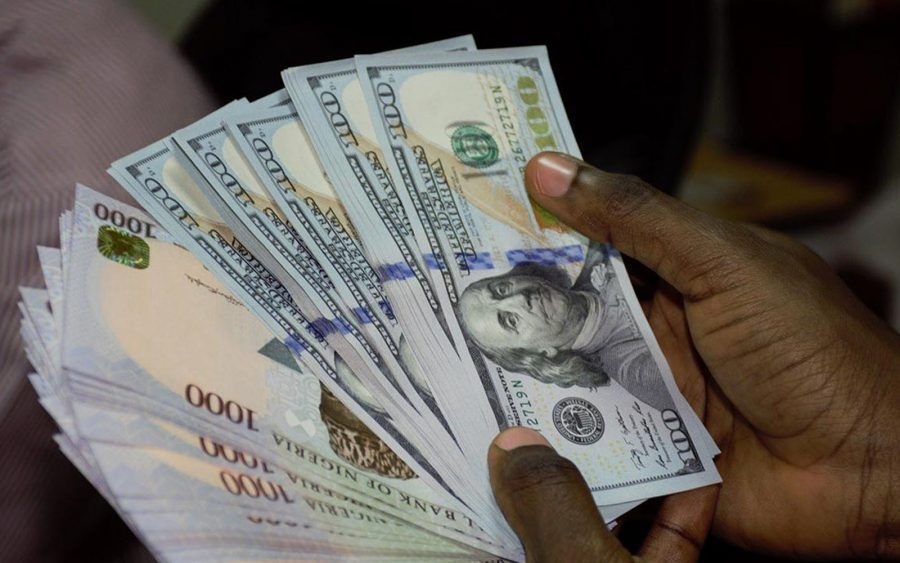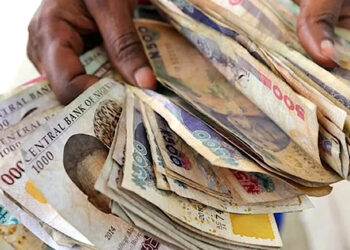Naira strengthened against the US dollar last week to a 2-month high of N535/$1 at the black market, thereby reducing the gap between the parallel and the official rates; an uptick that was driven by a significant drop in demand for FX at the black market.
The exchange rate, which had hovered around N570 to N572 to a dollar since September, gained over 600 basis points to N535/$1 in the early hours of Thursday, last week as BDC operators hinged it to improved forex liquidity and decrease in demand. It currently trades between N545-N550 at the black market depending on who you buy from.
Meanwhile, the gain at the black market has been attributed to a couple of factors, ranging from crude oil rally, boost in external reserves, increased corporate loans from the international debt market, workers remittances amongst others.
Read: Why it is risky to convert your naira to dollars or USD(T)
Foreign loans drive foreign exchange gain
A major boost in the country’s forex reserve via the $4 billion Eurobond raised in September has served as a significant buffer for the apex bank to continue intervening in the official forex market.
Since Nigeria secured the $4 billion Eurobond on September 22nd, a sum of $6.59 billion has been traded on the floor of the I&E window. This is a significant increase compared to $5.62 billion traded in the 36 days preceding the fundraise, implying more funds injected into the market.
As a result of the Eurobond inflow and $3.35 billion direct allocations, approved by the International Monetary Fund (IMF), Nigeria’s reserve recorded a boost of $5.05 billion in October, following a $2.76 billion gain recorded in the prior month. The nation’s foreign exchange reserve is now well above the $40 billion threshold.
Read: Naira vs Dollar: There was a currency…
Similarly, just as Nigeria moved to the international debt market for funds, Nigerian corporates also raised notable debt fundings from the international market as well. Fidelity Bank, a tier-2 bank, in October, successfully raised $400 million through its 5-year Eurobond issuance.
Another major company in the country with a recent successful Eurobond issuance is Access Bank, after raising $500 million unsecured Eurobond from major global investors from the United States and Europe, amongst others.
These corporate Eurobond issuances indicate more forex liquidity in the country and reduced demand for FX from the parallel market. It is also worth noting that, some Nigerians have stashed dollars during the decline four months ago when the CBN placed a ban on the sales of forex to BDC operators in the country.
Read: Naira on trial: Is devaluation the way out?
Crude oil rally boosts forex earnings
In the same vein, the impact of the recent crude oil rally on Nigeria’s exchange rate cannot be overemphasised, after gaining over 60% year-to-date, trading at record highs as the Organization of Petroleum Exporting Countries, kept a tight leash on crude supply in the market, which ensured a positive movement in the prices of crude oil.
Crude oil export accounts for about 90% of Nigeria’s forex earnings, hence any movement in the global price of crude oil will also affect the supply of foreign exchange in the country.
Other factors contributing to the recent gains in the parallel market include the rise in P2P transfers with increased crypto adoption in Nigeria. According to a report by Binance, the largest cryptocurrency platform by trading volume in the world, Nigeria is leading the charge as the #1 country leading cryptocurrency adoption.
Nigerian youths and investing minds are now moving into crypto investments and blockchain technology to hedge against inflation in the country, with headline inflation still very much in double figures.
The increased appetite for (foreign) remote working jobs has also helped in increasing FX liquidity in the country. The number of Nigerians working for foreign firms and earning dollars as freelancers has increased in recent times, as it is an opportunity for Nigerians to hedge against inflationary pressure with their multiple streams of income.
A cursory look at the balance of payment figures from the Central Bank of Nigeria shows that workers remittances into Nigeria increased to its highest level in five quarters, in Q2 2021. Specifically, workers remittances improved from $4.29 billion recorded in Q2 2020 to $4.91 billion in Q2 2021.
Expert views
Dumebi Udegbunam, a Fixed Income trader at United Bank for Africa (UBA) told Nairametrics that the sudden appreciation of the naira can be attributed to the continuous intervention by the CBN at the official market.
“The bank increased its supply to the I&E and other available outlets (retail FX auction, invisible, SMIS (secondary market intervention sales) which outweighed the demand for dollar and we were able to witness an appreciation in the value of the naira,” he said.
He added that an increase in oil price is also a major factor since about 90% of our foreign earnings are gotten from oil.
“Over the past 3 months, we have seen oil prices trade at a 7-year high and a 58% increase in price YOY. As at this time last year price of oil was just $47.88 now it’s trading at almost $83 with resistance at $85,” he said.
He further stated that Nigerian companies have attracted investments worth $19.1 billion from Foreign Portfolio Investments showing a 113% growth from $8.98 billion in the corresponding period of 2020. Hence, he opined that this appreciation in naira can be sustained if the country can tailor its policies towards backward integration.
At the Nairametrics Clubhouse #OnTheMoney Series hosted by Ugo Obi-Chukwu on Saturday, guest analysts provided insight into factors that must have driven the growth in the exchange rate.
An analyst at the discussion forum stated that the difference between the Naira at the official window and the parrel market is known as a liquidity premium. As a result, whenever an asset has a liquidity premium, even a little increase in liquidity can generate huge price swings. The liquidity in the interbank window has improved so we are seeing the price correction.
Furthermore, many Nigerian banks have begun to increase dollar spending limits with a number of notifications to the effect, received by customers of different banks, in the past one week.
On the flip side, Kalu Aja, Director of Finance and Operations at Community Foundation of Snohomish County, Washington, stated that there was little to back up the long-term recovery of the naira since the current account of the country is still the same.
He said, “Looking at the current account balance of Nigeria dated up to July 2021. The current account is talking about import exports, so the strength of the Naira is going to come down to import and export.”
He reiterated that Nigeria’s import is still more than her export so the nation will still spend more dollars. He also cited the fact that PMS imports have remained unchanged as is also the case with the nation’s foreign debts; situations that will likely see the dollar go back up in value against the naira.



















This is impressive
Thanks for the update
Can I get this again???
Thank for the information
Kudos to both up/down line for their contributn in d naira streghteening
I respect the analysis proposed here but I sincerely believe that we need to address the real issue which is our inability to produce due to insecurity caused by greed and selfishness.
As long as electricity continues to be elusive, Nigeria will continue to buy from outside it’s shores and the Naira will never know peace, analyze go front, analyze come back, nothing will change, the Naira will continue to suffer, but when electricity supply becomes stable, the industrial sector will thrive, there will be more jobs and less insecurity, more investments coming into Nigeria will further strengthen the Naira. In my final analysis, electricity is the “one drug cures all” that Nigeria needs.